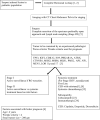Pediatric adrenocortical carcinoma
- PMID: 36387865
- PMCID: PMC9659577
- DOI: 10.3389/fendo.2022.961650
Pediatric adrenocortical carcinoma
Abstract
Adrenocortical carcinoma (ACC) is a rare endocrine malignancy of the adrenal gland with an unfavorable prognosis. It is rare in the pediatric population, with an incidence of 0.2-0.3 patients per million in patients under 20 years old. It is primarily associated with Li-Fraumeni and Beckwith-Wiedemann tumor predisposition syndromes in children. The incidence of pediatric ACC is 10-15fold higher in southern Brazil due to a higher prevalence of TP53 mutation associated with Li-Fraumeni syndrome in that population. Current treatment protocols are derived from adult ACC and consist of surgery and/or chemotherapy with etoposide, doxorubicin, and cisplatin (EDP) with mitotane. Limited research has been reported on other treatment modalities for pediatric ACC, including mitotane, pembrolizumab, cabozantinib, and chimeric antigen receptor autologous cell (CAR-T) therapy.
Keywords: adrenal tumor; adrenocortical cancer (ACC); endocrine tumors; pediatric adrenal tumors; pediatric adrenocortical carcinoma.
Copyright © 2022 Ilanchezhian, Varghese, Glod, Reilly, Widemann, Pommier, Kaplan and Del Rivero.
Conflict of interest statement
The authors declare that the research was conducted in the absence of any commercial or financial relationships that could be construed as a potential conflict of interest.
Figures
References
Publication types
MeSH terms
Substances
Supplementary concepts
Grants and funding
LinkOut - more resources
Full Text Sources
Research Materials
Miscellaneous


